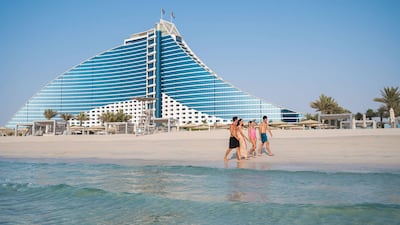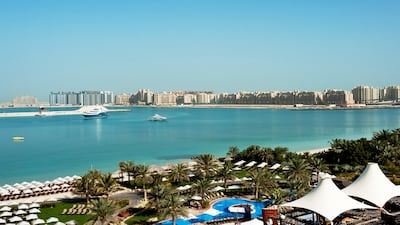Dubai's tourism industry is taking a more “nimble” approach to its pricing and providing cheaper hotel choices in response to the challenging global economic conditions that are tightening the budgets of travellers, the emirate's tourism chief has said.
The appetite for travel to Dubai “is still there”, with the emirate tapping into new and diversified source markets, Issam Kazim, chief executive of the Dubai Department for Tourism and Commerce Marketing (DTCM), told reporters.
However, Dubai is taking a strategic approach by offering the “right price and the right product” to capitalise on that demand, he said.
Mr Kazim was speaking on the sidelines of the Skift Global Forum East in the emirate.
“All indicators are saying that 2023 is going to be softer … disposable income is going to be a little less, so we are going to go back to the time where travel becomes a luxury and people are going to be a lot more selective,” he said.
“Hence ... It is about aligning with the industry to ensure that they too understand the challenges that are ahead of us, which means that we need to be a lot more agile and nimble in our pricing.”
Dubai's tourism industry is close to returning to pre-pandemic levels.
The emirate hosted 11.4 million overnight international visitors in the first 10 months of the year, up 134 per cent from the same period in 2021, according to data from its Department of Economy and Tourism (DET).
The 10-month performance is 16 per cent below the 13.5 million international visitors it hosted in the same period in 2019 before the onset of the Covid-19 pandemic.
Best known for its ultra-luxury hotels, fine dining and massive shopping malls, Dubai recorded an average occupancy rate of 72 per cent at its one-to-three-star hotels during the 10-month period in 2022, DET data shows.
Its 262 one-to-three-star hotel establishments, totalling 27,808 rooms, made up 19 per cent of its total hotel inventory.
“People are not necessarily willing to spend on five-star hotels. They want three-star hotels and that is why you have seen a growth in numbers of three-star hotels as well,” Mr Kazim said.
“So, we are trying to make sure we have the right product available at the right price at the right time.”
The UAE's hotel rates rose by 48 per cent from January to September 2022, compared with the same period in 2021, Wouter Geerts, head of research at Skift, said at a presentation during the event.
“Look at the stats that are also indicating that prices are up because of the demand and supply side of things, which shows you that the appetite for travel to Dubai is still there,” Mr Kazim said.
However, the emirate is taking a long-term approach by adjusting its tourism product and pricing to capitalise on pent-up demand for travel, rather than take a short-term view of recouping coronavirus-induced losses, he said.
At DET's annual City Briefing, held on Thursday during the Skift forum, Mr Kazim urged the gathering of Dubai's top tourism stakeholders to think about offering value for money to attract even more visitors as travellers from around the world tighten their purse strings.
“Given the fact that everyone is talking about a global recession in 2023 … we need to be aware that the spending power will be much less,” he said.
“Travel becomes a luxury that some people will struggle to afford.”
The International Monetary Fund in October cut its growth forecast for 2023 and warned of a cost-of-living crisis as the global economy continues to be affected by the Ukraine war, broadening inflation pressures and a slowdown in China.
The fund maintained its global economic estimate for this year at 3.2 per cent but downgraded next year's forecast to 2.7 per cent — 0.2 percentage points lower than the July forecast.
Mr Kazim said he was “very positive” about Dubai's potential to grow its international visitor numbers after taking a series of measures to attract more people to live in the emirate.
Helping more companies, investors, family offices and start-ups to set up in the city will lead to more new residents and a higher number of visiting friends and family, he said.
Last month, the UAE launched a national tourism strategy that is intended to attract 40 million hotel guests by 2031.
Dubai tourism performance
Dubai's average hotel occupancy between January and October 2022 stood at 71 per cent, up from 64 per cent in the corresponding period last year and slightly below the 74 per cent recorded during the pre-pandemic period of 2019.
Hotels in Dubai Marina and Bur Dubai had the highest hotel occupancy (76 per cent), followed by Al Barsha (75 per cent) and Deira and The Palm Jumeirah (both at 74 per cent).
Dubai’s occupancy closely trailed the top benchmark cities of Istanbul (75 per cent), New York (74 per cent), Paris (73 per cent), London (73 per cent) and Los Angeles (72 per cent), DET data showed.
Revenue per available room (RevPar), a performance metric for the hospitality industry, rose to $127 in the 10-month period, from $87 in the corresponding period in 2021.
Globally, was Dubai ranked fifth after Paris ($224), New York ($202), London ($159) and Los Angeles ($146).
_______________________________
10 of the best family-friendly hotels in Dubai
_______________________________
The emirate's hotel supply was up by 18 per cent over pre-pandemic levels, with inventory in October 2022 reaching 144,737 rooms at 790 hotel establishments, compared with 122,185 rooms available at the end of October 2019 across 724 establishments.
The total number of hotels in the first ten months of 2022 rose by 8 per cent over the same period in 2021, showing strong investor confidence in Dubai’s tourism sector, the DET said.
In the first half of 2022, leisure travellers made up 80 per cent of visitors to Dubai, followed by business travellers (6 per cent), those who were visiting friends or family (13 per cent) and those who came for “other” reasons (1 per cent), the DET said.
From January to November, Dubai submitted bids for 370 international business events and won the right to host 212 others in the future.
The emirate has a total of 283 international business events that it will host in the future, the DET said.
Helal Al Marri, director general of the DET, said Dubai's tourism performance in the first 10 months of the year was “a testament to our city’s resilience, robust and diversified market strategy, solid collaboration model between the government and private sectors, and the strength of the city’s diverse destination proposition”.
“We are well-placed to end this year on a resounding note and perform even better in 2023 and beyond,” he said.











